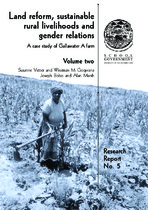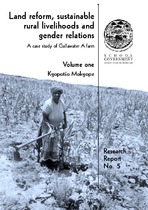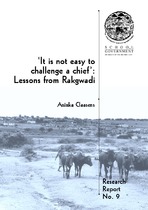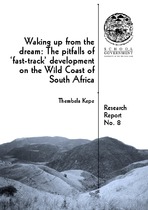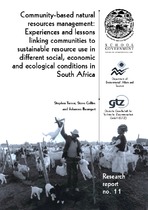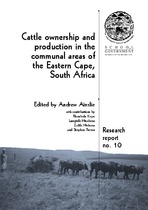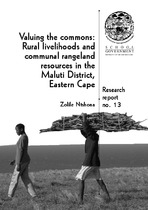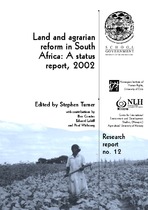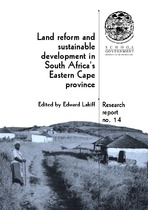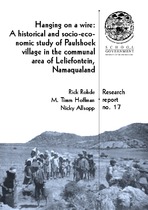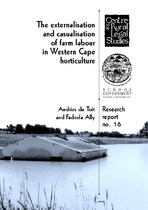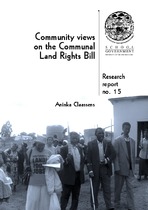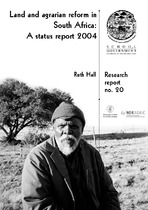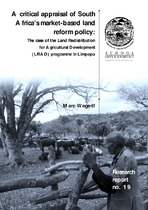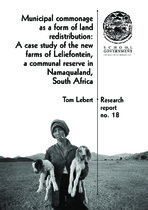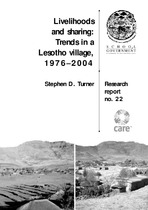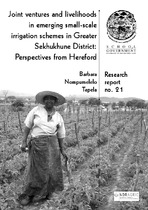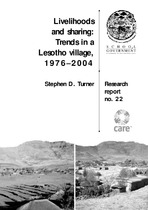Browsing Research Reports by Issue Date
Now showing items 1-20 of 97
-
Land reform, sustainable rural livelihoods and gender relations: A case study of Gallawater A farm: Volume 2
(Institute for Poverty, Land and Agrarian Studies, University of the Western Cape, 2000)There is an ongoing debate about the sustainability of South African communal rangelands as old views on overgrazing and degradation are being widely challenged. The degradation issue has recently received renewed ... -
Land reform, sustainable rural livelihoods and gender relations: A case study of Gallawater A farm: Volume 1
(Institute for Poverty, Land and Agrarian Studies, University of the Western Cape, 2000)The research project aimed to investigate the impact of land reform processes on sustainable rural livelihoods and on gender relations in South Africa by examining a case study in the Eastern Cape province. -
'It is not easy to challenge a chief ': Lessons from Rakgwadi
(Institute for Poverty, Land and Agrarian Studies, University of the Western Cape, 2001)When Thoko Didiza was appointed Minister for Agriculture and Land Affairs in 1999, one of her earliest policy decisions was to stop work on the draft Land Rights Bill and to announce her intention to transfer the title ... -
Waking up from the dream: The pitfalls of 'fast-track' development on the Wild Coast
(Institute for Poverty, Land and Agrarian Studies, University of the Western Cape, 2001)The main aim of this study was to explore the issues involved in reconciling the policy objectives of land reform, environmental conservation and the private sector profit-oriented rural development initiative in ... -
Community-based natural resources management: Experiences and lessons linking communities to sustainable resource use in different social, economic and ecological conditions in South Africa
(Institute for Poverty, Land and Agrarian Studies, University of the Western Cape, 2002)The project, which started in 1996 in partnership with the South African Department of Land Affairs (DLA), supports communities that have a stake in nature conservation areas through ownership, or a claim to ownership, ... -
Cattle ownership and production in the communal areas of the Eastern Cape, South Africa
(Institute for Poverty, Land and Agrarian Studies, University of the Western Cape, 2002)This report documents a study of the social and economic structure of cattle ownership and production in the communal tenure areas of the Eastern Cape (i.e. the former Bantustans of Transkei and Ciskei). The report ... -
Valuing the commons: Rural livelihoods and communal rangeland resources in the Maluti District, Eastern Cape
(Institute for Poverty, Land and Agrarian Studies, University of the Western Cape, 2002)The ‘hidden’ value of wild resources, trees and grazing resources on communal rangelands is often overlooked by conventional economic assessments, even though their contribution to people’s lives is enormous. There is ... -
Land and agrarian reform in South Africa: A status report, 2002
(Institute for Poverty, Land and Agrarian Studies, University of the Western Cape, 2002)In 1994, South Africa started a new life as a democratic nation. It faced immense challenges. Multiple economic, social and political transformations were needed to overcome the legacy of colonialism and apartheid. The ... -
Community-based natural resources management: Experiences and lessons linking communities to sustainable resource use in different social, economic and ecological conditions in South Africa
(Institute for Poverty, Land and Agrarian Studies, University of the Western Cape, 2002)The project, which started in 1996 in partnership with the South African Department of Land Affairs (DLA), supports communities that have a stake in nature conservation areas through ownership, or a claim to ownership, ... -
Land reform and sustainable livelihoods in South Africa's Eastern Cape province
(Institute for Poverty, Land and Agrarian Studies, University of the Western Cape, 2002)The Eastern Cape is one of the nine provinces of South Africa, located in the south-east of the country along the Indian Ocean seaboard. The area was a site of prolonged struggle between native peoples, principally Xh ... -
Hanging on a wire: A historical and socio-eco- nomic study of Paulshoek village in the communal area of Leliefontein, Namaqualand
(Institute for Poverty, Land and Agrarian Studies, University of the Western Cape, 2003)Namaqualand is often considered an anomaly in South African social science research because of its distinct cultural, social and environmental conditions. No doubt, Namaqualand has many extremes: a sparse population, ... -
The externalisation and casualisation of farm labour in Western Cape horticulture
(Institute for Poverty, Land and Agrarian Studies, University of the Western Cape, 2003)On several Friday nights during February and March 2001, a visitor to Happiness Street1 in the Oostenberg Municipality s newly created Westbank housing project would have witnessed angry scenes. A small crowd of frustrated ... -
Community views on the Communal Land Rights Bill
(Institute for Poverty, Land and Agrarian Studies, University of the Western Cape, 2003)The Programme for Land and Agrarian Studies (PLAAS) and the National Land Committee (NLC) responded to the lack of effective government consultation with communities on the draft Communal Land Rights Bill (CLRB) by ... -
Land and agrarian reform in South Africa: A status report 2004
(Institute for Poverty, Land and Agrarian Studies, University of the Western Cape, 2004)This is the third in a series of ‘status reports’ on land and agrarian reform in South Africa published by the Programme for Land and Agrarian Studies (PLAAS). These reports set out to assess progress, problems and ... -
A critical appraisal of South Africa’s market-based land reform policy: The case of the Land Redistribution for Agricultural Development (LRAD) programme in Limpopo
(Institute for Poverty, Land and Agrarian Studies, University of the Western Cape, 2004)In 1996 less than 1% of the population owned and controlled over 80% of farm land. This 1% was part of the 10.9% of the population classified as white (Stats SA 2000). Meanwhile, the 76.7% of the population that is ... -
Municipal commonage as a form of land redistribution: A case study of the new farms of Leliefontein, a communal reserve in Namaqualand, South Africa
(Institute for Poverty, Land and Agrarian Studies, University of the Western Cape, 2004)This paper examines the implementation of a quasi-commercial land use system on newly acquired municipal commonage in Leliefontein, a former ‘coloured reserve’ in Namaqualand, Northern Cape. This land has been ... -
Livelihoods and sharing: Trends in a Lesotho village, 1976–2004
(Institute for Poverty, Land and Agrarian Studies, University of the Western Cape, 2005)In 2004 I was fortunate enough to be able to return to Ha Tumahole, the village in Lesotho where I undertook research on farming and livelihoods in 1976–77, and spend four weeks learning about what had changed in ... -
Joint ventures and livelihoods in emerging small-scale irrigation schemes in Greater Sekhukhune District: Perspectives from Hereford
(Institute for Poverty, Land and Agrarian Studies, University of the Western Cape, 2005)Small-scale irrigation farming is envisaged as playing a progressively larger role in rural development and in reducing some of the inequalities inherent in South Africa’s space economy. The promotion of entry by black ... -
Joint ventures and livelihoods in emerging small-scale irrigation schemes in Greater Sekhukhune District : Perspectives from Hereford
(PLAAS, University of the Western Cape, 2005-09)This report is based on research carried out between June 2003 and April 2005 in the Greater Sekhukhune Cross-Border District Municipality, which straddles the boundaries of the Mpumalanga and Limpopo provinces. This ... -
Livelihoods and sharing: Trends in a Lesotho village, 1976–2004
(PLAAS, University of the Western Cape & Cooperative for Assistance and Relief Everywhere Inc. (CARE), 2005-10)The study compares the livelihoods and inter-household sharing mechanisms in a Lesotho village across a 28 year period. The report examines the complex socio-economic structures and systems that are in place in the rural ...

